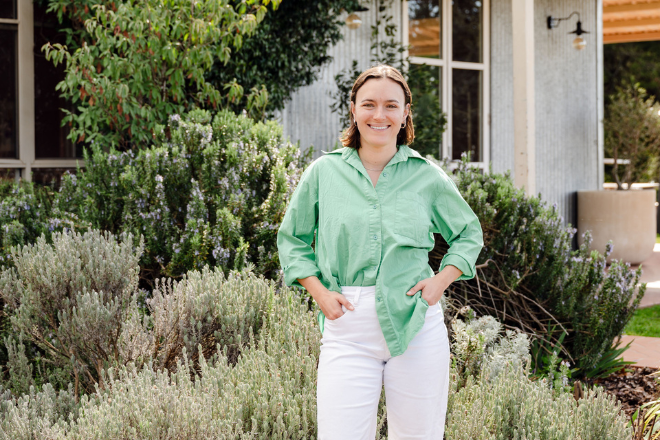Energy reductions the key to unlocking feed cost savings


At her family’s organic vineyard See Saw Wines, surrounded by grazing sheep, Maggie Jarrett is quietly architecting strategic industry evolution. As the recipient of the 2025 Nuffield Scholarship supported by AgriFutures Australia, she’s taking aim at one of agriculture’s most pressing challenges: turning Environmental, Social, and Governance (ESG) reporting from a burden into a benefit for small producers.
The ESG conundrum
ESG reporting – a catch-all term for documenting sustainability practices – has become a household term in the Australian agricultural sector, but things get foggy when you look into what parts of the sector are actually taking responsibility for it.
“There’s no regulatory requirement for small to medium enterprises in Australia to address ESG,” Maggie explains, “but what we’re seeing in Australia is that corporations are setting ESG goals and pushing those requirements onto their supply chain.”
It’s a scenario playing out across Australian agriculture. Major retailers and processors, under pressure to meet sustainability targets, are demanding increasingly complex data from their suppliers. For small farmers already operating with tight margins, these requirements add another layer of complexity to an already challenging business environment.
“It’s tricky because there’s no clear framework,” says Maggie. “Producers might be asked for data without understanding its value in the supply chain or for their business.”
For Maggie, ESG isn’t just an academic interest. At See Saw Wines, her family’s 900-ton wine processing operation that exports to markets including the USA, Vietnam, Norway and Japan, she handles both ESG reporting and exports. This real-world experience has given her unique insights into both the challenges and opportunities of sustainability reporting.
“The system is a bit of a mess,” Maggie states plainly. “Every corporate, government body and industry group is making up their own reporting standards, and producers have to deal with different formats and requirements.”
The lack of structure and standardisation means producers are often left in the dark about how their data will be used, what value it actually provides and what rights they have when sharing sensitive information about their operations.
“Many producers sign contracts without understanding the implications because they need market access, and with slim margins, they’ll agree to anything just to stay in the game,” Maggie says.
“There’s also a cost to all this – consultants, tech groups and endless paperwork add to the financial and time burden of running a profitable business. When there’s no clear benefit to the farm, the supply chain, or the environment, it’s difficult to justify the investment.”
Seeking global solutions
Maggie’s Nuffield Scholarship will take her around the world – funding from AgriFutures Australia has provided her with a unique opportunity to step away from her family business without financial pressure. She plans to visit countries with strong sustainability programs, such as Ireland, as well as to step outside agriculture and visit technology businesses like Xero.
“I’m curious to see what these other businesses are doing and how we could utilise these programs to help with data management and the streamlining of data collection,” she says.
Her investigation will span the entire supply chain, from primary producers who have transformed ESG reporting into a business tool to businesses that successfully use sustainability data to educate consumers about their products.
“As ESG reporting is still in its infancy, there is opportunity right now to understand and create a reporting system that is focused on collecting the right data from primary producers in a streamlined way,” Maggie explains.
From compliance to capability
Rather than simply critiquing the current system, Maggie has clear ideas about what good ESG reporting should look like and how it can evolve from an administrative burden into a strategic farm asset.
“We need to stop, step back, and look at the bigger picture. Right now, we’re spending a lot of money on ESG compliance without actually improving environmental outcomes or profitability on farms.”
Maggie sees potential for the government to play a role in establishing baseline frameworks using existing public data like soil health mapping, while she believes industry bodies could be well-equipped for developing sector-specific approaches.
“Each industry and region needs a risk analysis,” she says. “If you take the wine industry, for example, each grape-growing region should assess climate risks, market risks, and social impacts to determine their top priorities for the next 20 to 100 years.”
Maggie’s long-term vision is to convert ESG reporting from merely ticking regulatory boxes into a valuable business tool that strengthens farmers’ market position. As her travels and research progress, she expects her understanding of potential solutions to deepen considerably.
“I’m keeping an open mind throughout this process,” she says. “My ideas will certainly evolve as I investigate different approaches around the world. That’s the beauty of the Nuffield Scholarship – it gives me the opportunity to challenge my own thinking and discover solutions I haven’t even considered yet.”
 CHICKEN MEAT / 03.04.25
CHICKEN MEAT / 03.04.25  NATIONAL CHALLENGES AND OPPORTUNITIES / 03.04.25
NATIONAL CHALLENGES AND OPPORTUNITIES / 03.04.25  EXPORT FODDER / 03.04.25
EXPORT FODDER / 03.04.25